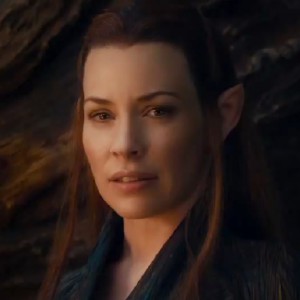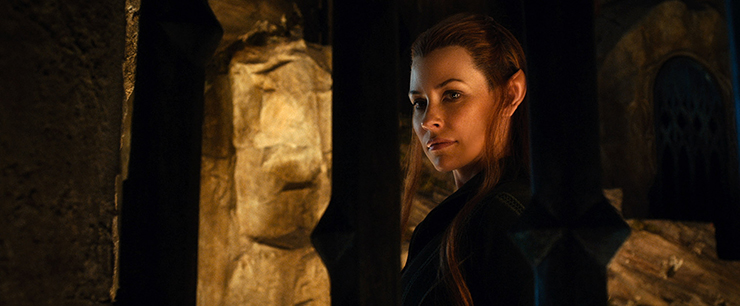 Question: What part of this experience did you not see coming? What’s been the most unexpected aspect?
Question: What part of this experience did you not see coming? What’s been the most unexpected aspect?
Question: Mischievous grin, is that?
Lilly: Yes! How honest do I be?
Question: As honest as possible.
Lilly: The most surprising aspect of this was how incredibly unorganized the whole process is. I just couldn’t imagine– You always imagine big budget movies being, you know, everything is nailed down, sealed and it works like a well-oiled machine. And this is like bumbling, stumbling through with our blindfolds on. I think I once said that it was intelligent chaos, at least, because I feel like I have fallen into Peter Jackson’s mind. And it’s crazy in there!
Question: That’s sort of interesting. Your character, you signed on, there are things you liked and loved, and then this process, this chaos that we all know about. How much has changed for Tauriel during that time?
Lilly: I’ll tell you what, I wish I’d known all that I knew then, because I would have signed a different deal. I’ve been lucky enough to have Fran and Phil expand the character, enrich the character, grow her, embellish her, empower her. She was originally a much more peripheral character, and she’s come deeper and deeper into the center of the story and into the foray.
And I’m just really grateful for that because it’s given me a chance to do as much as I possibly can in these movies, and have a lot more fun and have more opportunities to do great work. And I definitely came into these movies thinking, “I’ll just do a little role. I’ll be in and out. Won’t take long. Won’t take much out of me,” and it was a whole different story once I got here.
Question: It seems like Tauriel has evolved into the place where her relationship with Kili is going to be a big part of the heart of, especially, the third film. And really, none of that was in the book. In Rings you had Aragorn and Liv Tyler.
Lilly: Arwen.
Question: Arwen. For some reason I just blanked on her name. So there’s no equivalent to that in Tolkien’s book. So do you feel the weight of some of the emotional impact of the third, of the trilogy is kind of–
Lilly: No, I think that it’s an access point. Because The Hobbit, I loved it as a child. It was my favorite book. And then I hadn’t read it since I was a kid. So I went back and re-read it when I got this job. And what I was surprised to realize was how basic the book is. There isn’t any emotion in it. There isn’t any characters that you become so– Other than the hobbit, other than Bilbo who you go on this journey with him. But there isn’t really a deep emotional center to the book. It’s a very nice romp. It’s a sweet little story.
And to watch nine hours of film without some kind of emotional draw and payoff, nobody would sit through it. And I think in the third film particularly, like you said, the moments where Tauriel is struggling for her life, to save Kili’s life, or he’s struggling to save hers, with that emotional tears going on, which is very deep, and now I’ve acted it so I know just how emotional it gets, I think it’s an opening for the audience to feel what they are going to want to feel at the devastation that will happen at the Battle of the Five Armies. Because you need the individual stories for the audience to access the emotion.
If they just see general chaos and general death and general loss, they don’t find a way to cry. And every audience member wants to cry. They want someone on that screen to make them cry. So I’m trying to make them cry.
Question: Beyond the romance– You talked about The Hobbit being a simple, sweet story, right? There were no female characters, really, in The Hobbit that I can recall, unless they were totally on the periphery.
Lilly: Yeah, there weren’t any.
Question: And, I guess, stepping beyond the romantic part of your character’s journey, is that an important aspect to you, that you are bringing a female presence to this?
Lilly: (overlaps) Yeah. I think that Tolkien was writing in a time when women were considered secondary citizens in society and they were not considered pivotal parts of life events. They were just people who witnessed life whereas men were actually driving life. And I think for anyone to make a story in this day and age, when we’ve come so far with realizing women’s place in the world and acknowledging them as equal citizens in the world, and then to continue with that chauvinistic mindset of keeping women out of your story completely, I think it would be a wrong move.
I think it’s important to know that he was writing at a time when that was okay. And now that’s not okay. And everybody knows that’s not okay. And nobody faults Tolkien for it. He was a result of his time. But we have evolved past that and we have to represent that. I have to say though, on that note, because people often say to me when I’m playing these women who are very violent, “Oh, cool, you’re playing an empowered woman.” And I don’t buy that. I think the industry is still so driven by male mindset that they think an empowered woman is a woman acting like a man.
And I can say, “**** you.” An empowered woman is a woman who has compassion, who stands up for justice, who sacrifices herself in the face of struggle, who has he own sense– We have our own place in the world. And I don’t believe our place is turning around and shooting someone in the face because they pissed you off. That is the immaturity of unevolved men. And I think we’re bigger than that.
And I think that eventually, one day, our stories, women’s stories will start to reflect that properly. But for now, it’s a baby step in the right direction. At least she’s not at home cooking the pies, and I’m happy to play her.
Question: That’s the extended edition.
Question: Was this a conversation that you had with Fran and with Phil? Have you sat down and actually had that talk with them, or did you not need to?
Lilly: (overlaps) No. We haven’t. Because when I signed on, I knew what I was signing on for. She was the warrior elf. And I was excited to play the warrior elf because I knew it would be fun, I knew it would be cool. And one of the cool things about being an elf is that I never ever would kill a human being, I would never kill a dwarf. I would never– No matter how much I don’t like them. I would never kill another elf, I would never kill anything that had goodness in it. We only kill evil incarnate.
And so it is a distinction from what you see in human violence, which is humans killing other humans when all of us know that every human being has shreds of good in them, no matter what they’re doing, no matter how bad it is. An orc doesn’t have a shred of good in it. It is evil incarnate. And so killing evil incarnate feels somehow more justified.
Question: I don’t know, fifty years from now, after we know Orcs a little bit better, you may get a chance.
Question: (overlaps) You want to tell their story.
Lilly: Yeah. Yeah, we’ll start telling the Orcs’ story.



